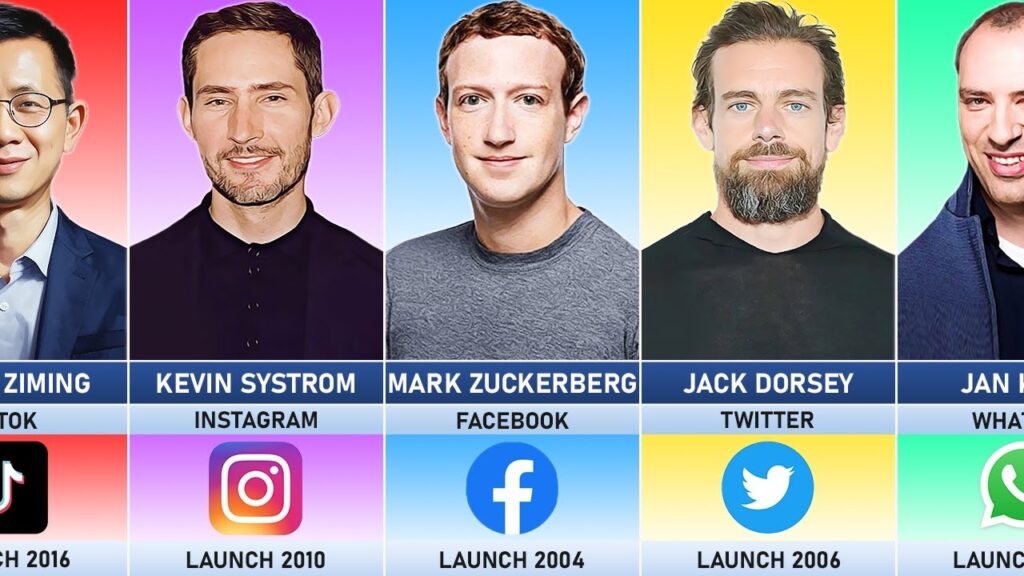List of Social media founders who helped shape the way we connect online:
1. Andrew Weinreich – Six Degrees (1997)
- Often considered the first modern social network, Six Degrees allowed users to create profiles, list friends, and make connections with others.
2. Jonathan Abrams – Friendster (2002)
- Friendster was an early social networking site where users could connect with friends and meet new people. It set the foundation for later networks like Myspace and Facebook.
3. Tom Anderson & Chris DeWolfe – Myspace (2003)
- Myspace became a global phenomenon in the mid-2000s, offering users customizable profiles, music integration, and blogs.
4. Mark Zuckerberg, Eduardo Saverin, Andrew McCollum, Dustin Moskovitz, Chris Hughes – Facebook (2004)
- Facebook revolutionized social networking with its clean interface and ability to easily share updates, photos, and more. It remains the largest social media platform.
5. Jack Dorsey, Evan Williams, Biz Stone, Noah Glass – Twitter (2006)
- Twitter’s introduction of microblogging (140-character posts, later expanded) changed the way news and information spread in real-time.
6. Kevin Systrom & Mike Krieger – Instagram (2010)
- A photo and video-sharing platform that quickly became popular for its simple, visual focus. Acquired by Facebook in 2012.
7. Evan Spiegel, Bobby Murphy, & Reggie Brown – Snapchat (2011)
- Snapchat introduced disappearing messages and multimedia content that expired after viewing, pioneering the “Stories” format now used on many platforms.
8. Reid Hoffman, Allen Blue, Konstantin Guericke, Eric Ly, Jean-Luc Vaillant – LinkedIn (2002)
- A professional networking platform that focuses on business and career development. LinkedIn has become essential for job seekers and businesses alike.
9. David Karp – Tumblr (2007)
- Tumblr combined blogging with social networking, offering a place for users to post multimedia content and follow other users’ blogs.
10. Ben Silbermann, Paul Sciarra, & Evan Sharp – Pinterest (2010)
- A visual discovery and bookmarking platform where users can “pin” images and links related to interests, hobbies, and projects.
11. Jan Koum & Brian Acton – WhatsApp (2009)
- WhatsApp revolutionized instant messaging by providing an easy, reliable, and free platform for users to send text, images, and video globally. Acquired by Facebook in 2014.
12. Daniel Ek & Martin Lorentzon – Spotify (2006)
- While not a traditional social media platform, Spotify introduced social features such as shared playlists and activity feeds, combining music streaming with social elements.
13. Alex Zhu & Luyu Yang – Musical.ly (2014)
- Musical.ly allowed users to create short lip-sync videos, which became incredibly popular. In 2018, it was merged into TikTok.
14. Zhang Yiming – TikTok (2016)
- TikTok (by ByteDance) exploded globally with its short-form videos, viral challenges, and powerful algorithm. It’s one of the fastest-growing social media platforms today.
15. Ryan Hoover – Product Hunt (2013)
- A platform where entrepreneurs, developers, and tech enthusiasts share and discover new products, apps, and technology.
16. Pavel Durov – VK (2006) and Telegram (2013)
- VK (formerly Vkontakte) is one of the largest social networking platforms in Russia and Eastern Europe. Telegram is a popular messaging platform known for its focus on privacy and security.
17. Jared Morgenstern – Yik Yak (2013)
- Yik Yak allowed users to post anonymous, location-based content, making it popular among college students, although it was later discontinued.
18. Philipp Mohr – Houseparty (2016)
- Houseparty allowed users to join live group video chats. It was particularly popular during the COVID-19 pandemic before being discontinued in 2021.
19. Alexis Ohanian & Steve Huffman – Reddit (2005)
- Reddit is a social news aggregation, web content rating, and discussion platform where users can create communities, or “subreddits,” focused on specific topics.
20. Garrett Camp & Travis Kalanick – Uber (2009)
- Although a ride-sharing app, Uber integrated social elements with its ride-sharing feature, allowing users to share rides and ratings, making it a social experience.
These founders have played significant roles in shaping the social media landscape, with their innovations leading to the platforms billions of people use daily. Let me know if you’d like to dive deeper into any of them!



